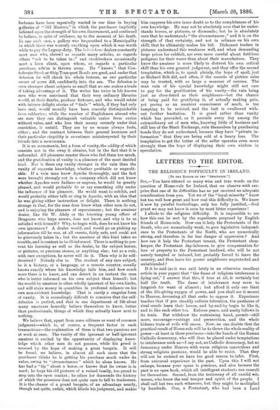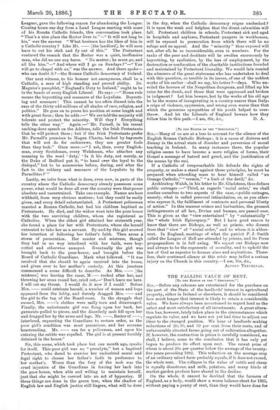LETTERS TO THE EDITOR.
THE RELIGIOUS DIFFICULTY IN IRELAND.
ITO THE EDITOR OF THE " SPECTATOR.1
SIR,—You have uttered so many wise and true words on the question of Home-rule for Ireland, that we observe with sur- prise that one of its difficulties has as yet received no adequate consideration from you. Yet we of the "loyal minority" know but too well how great and how real this difficulty is. We know it now by painful forebodings, only too fully justified,—God. grant we may not know it soon by most bitter experience !
I allude to the religious difficulty. It is impossible to see how this can be met by the expedients proposed by English friends of Home-rule. How can it help the Protestants of the South, who are numerically weak, to give legislative independ- ence to the Protestants of the North, who are numerically strong, and therefore in far less danger of oppression ? And how can it help the Protestant tenant, the Protestant shop- keeper, the Protestant day-labourer, to give compensation for loss of property to the Protestant landlord, who will be not merely tempted or induced, but probably forced to leave the country, and thus leave his poorer neighbours unprotected and unbefriended ?
If it be said (as it was said lately in an otherwise excellent article in your paper) that "the flame of religions intolerance is dying out," I answer that this, if true at all, is certainly but half the truth. The flame of intolerance may seem to languish for want of aliment ; but afford it only one blast of the life-giving oxygen of power, and you shall see it mount to Heaven, devouring all that seeks to oppose it. Experience teaches that if you steadily enforce toleration, the partisans of rival creeds learn their lesson, and by-and-by begin to like it, and to like each other too. Enforce peace, and amity follows in its train. But withdraw the restraining hand, permit—still more, encourage—outrage and persecution, and the whole hideous train of evils will ensue. Now, no one doubts that the practical result of Home-rule will be to throw the whole reality of power—at least in three provinces—into the hands of the Roman Catholic democracy, who will thus be placed under temptations to intolerance such as—I say not, no Catholic democracy, but no democracy under Heaven with warm religious convictions and strong religious passions, would be able to resist. That they will not be resisted we have too good reason to infer. First, from universal experience in the past. Upon this I will not enlarge, because your space is precious, and also because the past is an open book, which all intelligent students can consult for themselves. Second, from the testimony of all candid wit- nesses, who know the real temper and spirit of the people. I shall call but two such witnesses, but they might be multiplied by hundreds. One, a Protestant, who had been a Land Leaguer, gave the following reason for abandoning the League. Corning home one day from a Land League meeting with some of his Roman Catholic friends, this conversation took place. 4' That's a nice place the Rector lives in."—" It will not long be his," was the answer. " What business has the likes of him in .a. Catholic country ? Like Mr. — [the landlord], he will soon have to cut his stick and fly out of this." The Protestant ventured the remark that the Rector was a quiet, inoffensive man, who did no one any harm. "No matter ; he must go, and all like him."—" And where will I go on Sundays ?"—" You will go to chapel with us," was the answer. And there spoke— who can doubt it ?—the Roman Catholic democracy of Ireland.
Our next witness, to his honour not anonymous, shall be a Catholic, a man of high standing and proved ability. Dr. Maguire's pamphlet, " England's Duty to Ireland," ought to be in the hands of every English Liberal. He says :—" Home-rule means the boycotting and massacre of the Loyalists. Boycott- ing and massacre ! This cannot be too often dinned into the ears of the thirty odd millions of all shades of race, religion, and politics." He goes on to prove his position at some length and with great force ; then he adds :—" We are told the majority will tolerate and protect the minority. Will they ? Everything tells the other way." Again :—" Mr. Parnell, in his recent sucking-dove speech on the Address, tells the Irish Protestants that he will protect them ; but if the Irish Protestants prefer Mr. Parnell's promises to Magna Charta, backed by bayonets that will not do for cork-screws, they are greater fools than they look." Once more :—" I ask, then, every English. man, every Scotchman, every Welshman, who attaches any meaning to the word duty," Is it his ditty, not merely, as the Duke of Bedford put it, " to hand over the loyal to the disloyal," but to be accessories before, daring, and after the fact to the robbery and massacre of the Loyalists by the Parnellites ?' "
Lastly, we infer from what is done, even now, in parts of the -country where the Catholic democracy already possesses some power, what would be done all over the country were that power absolute and unrestrained. Take one example. Names are here withheld, from very obvious motives; but they could be easily given, and every detail substantiated. A Protestant policeman married a Roman Catholic, but had his children baptised as Protestants. He died, and the widow went into the poor-house with the two surviving children, whom she registered as Catholics. When the eldest girl attained her sixteenth year, she found a place for her with Protestants, whom she herself -entreated to take her as a servant. By-and-by this girl avowed her intention of following her father's faith. Then arose a storm of persecution. Her master and mistress, though they had in no way interfered with her faith, were boy- cotted and otherwise annoyed. Eventually the girl was brought back to the poor-house, and brought before the Board of Catholic Guardians. Mark what followed. " It was resolved that she should be again received into the house, and given over to her mother's custody. At this juncture -commenced a scene difficult to describe. As Mrs. — [the mistress] was leaving the room, M— rushed after her, and -throwing her arms round her, cried out,—' Don't leave me here. I will cut my throat. I would do it now if I could.' Before Mrs. — could extricate herself, a number of women and boys appeared from the lobby, and fiercely dragged Mrs. — and the girl to the top of the Board-room. In the struggle that ensued, Mrs. --'s clothes were sadly torn and disarranged. Finally, the unfortunate girl was flung upon her back, her garments pulled to pieces, and the disorderly mob fell upon her -and dragged her by the arms and legs. Mr. —, Rector of —, interfered, requesting the Guardians to restore order, as the poor girl's condition was most precarious, and her screams heartrending. Mr. — ran for a policeman, and upon his entering the rabble was expelled. The girl is at present forcibly detained in the house."
Sir, this scene, which took place but one month ago, speaks for itself. This poor girl was no " proselyte," but a baptised Protestant, who dared to exercise her undoubted moral and legal right to choose her father's faith in preference to her mother's. Worse than the fury of the mob was the 'Iornel injustice of the Guardians in forcing her back into the poor-house, when able and willing to maintain herself, just that she might be coerced into an act of hypocrisy. If these things are done in the green tree, when the shadow of English law and English justice still lingers, what will be done in the dry, when the Catholic democracy reigns unchecked ? It is upon the weak and helpless that the direst calamities will fall. Protestant children in schools, Protestant sick and aged in hospitals and asylums, Protestant paupers in workhouses, will be exposed to persecution from which there will be no refuge and no appeal. And the " minority " thus exposed will not, after all, be so inconsiderable, even in numbers. For the ranks of the poor and destitute will be swollen enormously by boycotting, by spoliation, by the loss of employment, by the destruction or confiscation of the charitable institutions founded and maintained by Protestant liberality. We would fain remind the admirers of the great statesman who has undertaken to deal with this question, so terrible in its issues, of one of the noblest works of his earlier—shall we say, his better ?—days. Who un- veiled the horrors of the Neapolitan dungeons, and lifted up his voice for the dumb, and those that were oppressed and broken in judgment ? Let him beware, lest by the works of his old age he be the means of inaugurating in a country nearer than Italy, a reign of violence, oppression, and wrong even worse than that which the generous sympathies of his youth helped to over- throw. And let the Liberals of England beware how they follow him in this path.—I am, Sir, D. A.



































 Previous page
Previous page